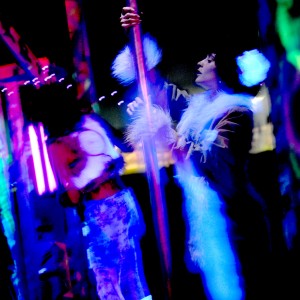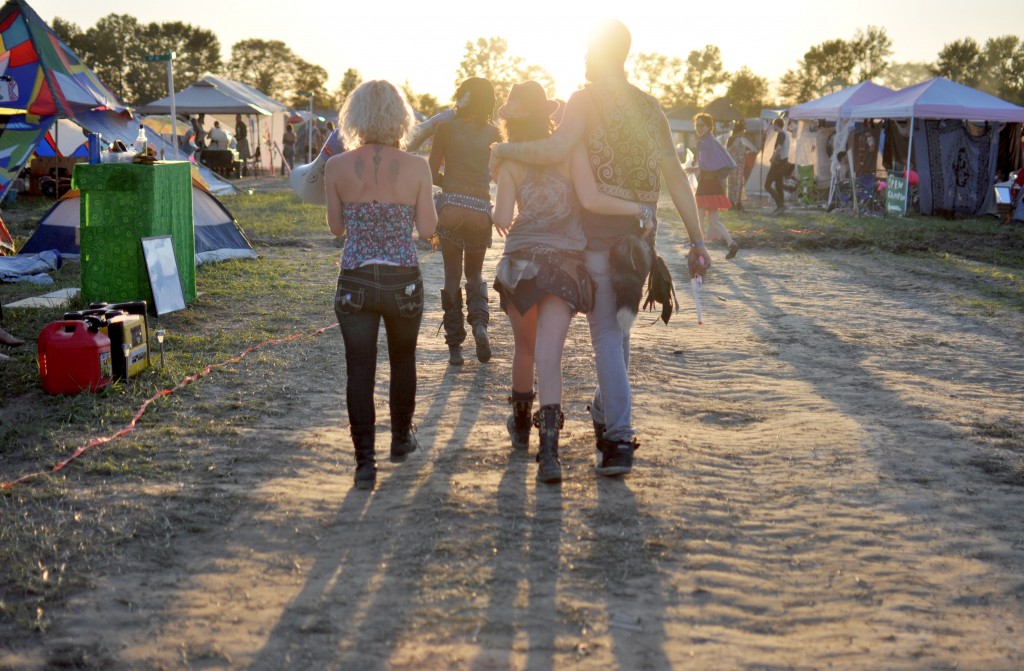
A discussion of Burning Man may, at first, seem out of place on a technology blog; however, as sociologist Fred Turner has previously observed, the ideology of Burner culture is profoundly co-implicated with the prevailing ideology of Web. It is more than mere coincidence that this particular festival has exploded in proximity to Silicon Valley. It is also more than coincidence that Google and other tech company virtually shut down during this event. The week-long temporary city in a desert attracts people from around the world. The community is founded upon the (seemingly paradoxical) principals of “radical self-reliance” and “communal effort.” For a week, Burners collectively construct a festive atmosphere that separates themselves from the institutions and customs of their everyday lives. There is a vibrant gift economy with a focus on the decommodification of goods and services (though, of course, like the Internet, much money changes hands behind the scenes: for infrastructure, transport, illicit ticket sales, drugs, etc.). Everyone is encouraged to participate in all aspects of the community (to “prosume” their surroundings), and in doing so, to reach a better understanding of self. This is all embodied in the Ten Principles of Burning Man.
Ten Principles
Radical Inclusion
Anyone may be a part of Burning Man. We welcome and respect the stranger. No prerequisites exist for participation in our community.Gifting
Burning Man is devoted to acts of gift giving. The value of a gift is unconditional. Gifting does not contemplate a return or an exchange for something of equal value.Decommodification
In order to preserve the spirit of gifting, our community seeks to create social environments that are unmediated by commercial sponsorships, transactions, or advertising. We stand ready to protect our culture from such exploitation. We resist the substitution of consumption for participatory experience.Radical Self-reliance
Burning Man encourages the individual to discover, exercise and rely on his or her inner resources.Radical Self-expression
Radical self-expression arises from the unique gifts of the individual. No one other than the individual or a collaborating group can determine its content. It is offered as a gift to others. In this spirit, the giver should respect the rights and liberties of the recipient.Communal Effort
Our community values creative cooperation and collaboration. We strive to produce, promote and protect social networks, public spaces, works of art, and methods of communication that support such interaction.Civic Responsibility
We value civil society. Community members who organize events should assume responsibility for public welfare and endeavor to communicate civic responsibilities to participants. They must also assume responsibility for conducting events in accordance with local, state and federal laws.Leaving No Trace
Our community respects the environment. We are committed to leaving no physical trace of our activities wherever we gather. We clean up after ourselves and endeavor, whenever possible, to leave such places in a better state than when we found them.Participation
Our community is committed to a radically participatory ethic. We believe that transformative change, whether in the individual or in society, can occur only through the medium of deeply personal participation. We achieve being through doing. Everyone is invited to work. Everyone is invited to play. We make the world real through actions that open the heart.Immediacy
Immediate experience is, in many ways, the most important touchstone of value in our culture. We seek to overcome barriers that stand between us and a recognition of our inner selves, the reality of those around us, participation in society, and contact with a natural world exceeding human powers. No idea can substitute for this experience.
What many people do not know, is that while Burning Man is not happening, there are many “regional burns” across the country. These smaller burns are usually in the Spring and Fall months and last for a weekend. Examples of this are Playa del Fuego in Delaware, Transformus in North Carolina, Apogaea in Colorado, and Burning Flipside in Texas. These events usually host around 2,000 people compared to the roughly 50,000 people in attendance at Burning Man.

Burners tend to refer to their lives outside of burns as their “default lives.” Used in the same way we describe the out-of-the-box setting on a consumer electronic, default implies something that was handed to you without your input. It is imposed. The default is what is not best for any individual, but is sufficient for the majority. The default is opposed to the virtual. The virtual in this case, refers to something yet to be actualized: this could be the blueprint for a building or a Utopian vision for social organization. It is in this sense that many theorists (e.g., Deleuze and Guattari) have, historically, used the term “virtual.” (It is important to note that this use of the term virtual is not identical to the (digital dualist) connotation of the term that has been popularized with the emergence of the Internet, which implies artificial, separate, and unreal). So, while, default life is constituted by whatever conditions currently prevail in society, Burns (like many other festivals [see Mikael Bakhtin’s classic Rabelais and his World]) seek to be a time outside of time. A place where the virtual is actualized, if only temporarily. Burns are made from whole cloth, positing themselves as a vision of radically different possibilities. One Burner captured this sentiment in a recent conversation with one of the authors, stating, “we are all possibilitarians.”
Unlike commercial music festivals, the activities that comprise a Burn are not top-down—with a few produces providing content for the many consumers. Instead (as sociologist Katherine Chen notes in a soon-to-be-printed article), Burns are both co-created and co-consumed. Rather than the few occupying the attention of the many, the many are on display for one another. This, of course, sounds an awful lot like the transition between Web 1.0 and Web 2.0. Burners give themselves new names, organize themselves into theme camps, and associate with their fellow burners casually, but in meaningful ways. There are frequent exchanges of hugs, gifts, performance, and conversation. These are momentary, but often very meaningful. The idea being that associations are freely enacted, but do not necessitate obligations by either party. In this way, the individual is allowed to be (and in many respects must be) radically self-reliant while at the same time, have a reasonable expectation of communal efforts in setting up a tent, getting some coffee in the morning, or making a human pyramid. Importantly, this is the same pattern of reciprocal, non-obligatory interaction is the foundation of online social media.

Though it is interesting to juxtapose Burner culture to social media (and to note the relative affluence of participants of each and the linkages between the organizers of both), it would be an overstatement to argue that there is a one-to-one correlation between the logic of Burning Man and the logic of social media. Social media use is clearly much broader than the participation in and identification with Burner culture. Moreover, there is a whole discussion to be had about how many sites, like Facebook, are monetized. However, the issue, here, is simply whether the surface ideology of Burning Man is mirrored on social media. To the extent that it is, are we all Burners?

Comments 2
This Blog is Not a Fungus » Cyborgology — January 5, 2012
[...] substrate that we impregnate with decaying cultures of past decades. Tattoos, Facebook, Burning Man, the iPhone, Twitter, sex dolls, wifi, internet memes, reality TV, geek culture, hipsters, video [...]
The Show is Back » Cyborgology — March 12, 2012
[...] of recursive, prosumer entertainment relies on the same self-organizing social forces that make Facebook or Performative Internet memes possible. The cohesion and dedication of these communities are [...]